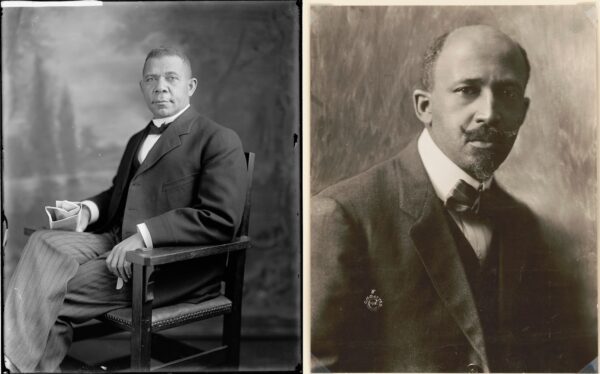
Voices of Change: Washington, Du Bois, and the Fight for Black American Progress
Explore the ideological debates between Booker T. Washington and W.E.B. Du Bois then lead students in a debate of their own.
acf domain was triggered too early. This is usually an indicator for some code in the plugin or theme running too early. Translations should be loaded at the init action or later. Please see Debugging in WordPress for more information. (This message was added in version 6.7.0.) in /nas/content/live/ncchredu/wp-includes/functions.php on line 6121April 4, 1856
Washington was born to an enslaved family on the Burroughs plantation in Hale’s Ford, Virginia.
April 16, 1861
Washington and his mother, Jane, remained on the Burroughs’ plantation throughout the war.
May 13, 1865
After the Civil War ended, Washington and his family moved to Malden, West Virginia.
1865–1871
Washington attends school and works in the Malden salt and coal mines.
February 23, 1868
W.E.B. Du Bois was born in Great Barrington, Massachusetts to a free Black family.
1872–1875
Washington attends and graduates from Hampton Normal and Agricultural Institute (now Hampton University) in Hampton, Virginia. Upon graduation from Hampton, Washington returns to Malden to teach youth and adults.
January 1, 1879
Washington accepts a teaching position at his alma matter.
July 4, 1881
Washington became the head of Tuskegee Normal School for Colored Teachers (now Tuskegee University) in Alabama and emphasizes industrial education for Black Americans.
1885–1888
Using money donated by neighbors and earned working as a teacher during the summers, Du Bois earned his bachelor’s degree from Fisk University.
1888–1890
Harvard did not accept credits from Fisk University, so Du Bois repeated his undergrad work and earned his second bachelor’s degree, this time in history.
1895
During his graduate work, W.E.B. Du Bois study at both the sociology graduate school at Harvard and at Friedrich Wilhelm University in Berlin, Germany. In 1895 he became the first Black American to earn a Doctor of Philosophy (PhD) from Harvard University.
September 18, 1895
Washington gave the “Atlanta Address” at the Cotton States and International Exposition in Atlanta, Georgia.
June 24, 1896
For his contributions to American society, Harvard University awarded Washington an honorary master’s degree.
July, 1897
Du Bois joined the faculty of Atlanta University where he taught history and economics.
March 11, 1900
Washington wrote to Du Bois regarding a Superintendent of Negro Schools of the District of Columbia. This letter is cited as one of the first means of direct communications between the two scholars.
1900
Washington founded the National Negro Business League and Washington’s first autobiography, The Story of My Life and Work, was published.
1901
Du Bois’ The Souls of Black Folks is published. In the book, Du Bois includes the essay, “Of Mr. Booker T. Washington and Others”, an extremely critical examination of Washington’s approach to Black American progress.
October 16, 1901
Booker T. Washington dined at the White House at the invitation of President Theodore Roosevelt. Washington’s visit was not well-received by white southerners.
January 6–8, 1904
While very few details of the meeting are known, in “The Washington-Du Bois Conference of 1904” Aptheker (1949) provided some information and explained the conference was prompted by Booker T. Washington with a focus on quelling anti-Washington rhetoric and having all leaders with diverse views regarding Black American progress come to some agreement. In a letter addressing the pending conference, W. E. B. Du Bois noted his platform centered on full political rights, higher education (for selected Black youth), industrial education for all, an aggressive fight for civil rights via the courts, etc.
1905
Du Bois co-founded the Niagara Movement, a civil rights organization that advocated for full civil liberties and political representation for African Americans.
September 22–24, 1906
Du Bois argued that the Atlanta Race Massacre was proof that Washington’s Atlanta Compromise was a failure as Black Americans were still under threat despite upholding their side of the bargain.
1909
Du Bois helped found the National Association for the Advancement of Colored People (NAACP), serving as the organization’s director of publications and research.
November 14, 1915
Booker T. Washington dies at his home in Tuskegee, Alabama.
1919
The NAACP began circulation of Du Bois’s influential magazine, The Crisis, which played a significant role in advocating for civil rights and social justice.
1933
After resigning his editorial position at The Crisis, Du Bois returns to teach at Atlanta University.
1943
Rufus Clement, President of Atlanta University, stirred up outrage when he abruptly fired Du Bois. Due to the outcry from other scholars, Atlanta University ultimately provided Du Bois with a lifelong pension and a professor emeritus title.
1950
The second edition of Du Bois’ The Souls of Black Folk is published, reinforcing its impact on African American literature and social commentary.
October, 1961
In 1961 Du Bois and his wife moved to Ghana to work on the Encyclopedia Africana, which the Ghanian government was funding.
August 27, 1963
Just one day before the March on Washington, W.E.B. Du Bois passes away in Accra, Ghana.
Featured in

Explore the ideological debates between Booker T. Washington and W.E.B. Du Bois then lead students in a debate of their own.